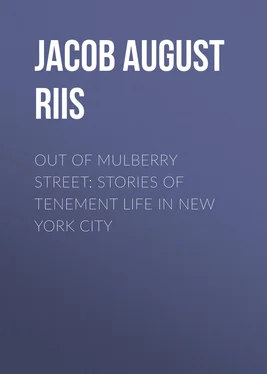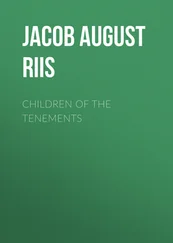Jacob August Riis - Out of Mulberry Street - Stories of Tenement life in New York City
Здесь есть возможность читать онлайн «Jacob August Riis - Out of Mulberry Street - Stories of Tenement life in New York City» — ознакомительный отрывок электронной книги совершенно бесплатно, а после прочтения отрывка купить полную версию. В некоторых случаях можно слушать аудио, скачать через торрент в формате fb2 и присутствует краткое содержание. Жанр: foreign_prose, foreign_antique, на английском языке. Описание произведения, (предисловие) а так же отзывы посетителей доступны на портале библиотеки ЛибКат.
- Название:Out of Mulberry Street: Stories of Tenement life in New York City
- Автор:
- Жанр:
- Год:неизвестен
- ISBN:нет данных
- Рейтинг книги:5 / 5. Голосов: 1
-
Избранное:Добавить в избранное
- Отзывы:
-
Ваша оценка:
- 100
- 1
- 2
- 3
- 4
- 5
Out of Mulberry Street: Stories of Tenement life in New York City: краткое содержание, описание и аннотация
Предлагаем к чтению аннотацию, описание, краткое содержание или предисловие (зависит от того, что написал сам автор книги «Out of Mulberry Street: Stories of Tenement life in New York City»). Если вы не нашли необходимую информацию о книге — напишите в комментариях, мы постараемся отыскать её.
Out of Mulberry Street: Stories of Tenement life in New York City — читать онлайн ознакомительный отрывок
Ниже представлен текст книги, разбитый по страницам. Система сохранения места последней прочитанной страницы, позволяет с удобством читать онлайн бесплатно книгу «Out of Mulberry Street: Stories of Tenement life in New York City», без необходимости каждый раз заново искать на чём Вы остановились. Поставьте закладку, и сможете в любой момент перейти на страницу, на которой закончили чтение.
Интервал:
Закладка:
Tramp! tramp! comes the to-morrow upon the stage. Two hundred and fifty pairs of little feet, keeping step, are marching to dinner in the Newsboys’ Lodging-house. Five hundred pairs more are restlessly awaiting their turn up-stairs. In prison, hospital, and almshouse to-night the city is host, and gives of her plenty. Here an unknown friend has spread a generous repast for the waifs who all the rest of the days shift for themselves as best they can. Turkey, coffee, and pie, with “vegetubles” to fill in. As the file of eagle-eyed youngsters passes down the long tables, there are swift movements of grimy hands, and shirt-waists bulge, ragged coats sag at the pockets. Hardly is the file seated when the plaint rises: “I ain’t got no pie! It got swiped on me.” Seven despoiled ones hold up their hands.
The superintendent laughs—it is Christmas eve. He taps one tentatively on the bulging shirt. “What have you here, my lad?”
“Me pie,” responds he, with an innocent look; “I wuz scart it would get stole.”
A little fellow who has been eying one of the visitors attentively takes his knife out of his mouth, and points it at him with conviction.
“I know you,” he pipes. “You’re a p’lice commissioner. I seen yer picter in the papers. You’re Teddy Roosevelt!”
The clatter of knives and forks ceases suddenly. Seven pies creep stealthily over the edge of the table, and are replaced on as many plates. The visitors laugh. It was a case of mistaken identity.
Farthest down-town, where the island narrows toward the Battery, and warehouses crowd the few remaining tenements, the somber-hued colony of Syrians is astir with preparation for the holiday. How comes it that in the only settlement of the real Christmas people in New York the corner saloon appropriates to itself all the outward signs of it? Even the floral cross that is nailed over the door of the Orthodox church is long withered and dead: it has been there since Easter, and it is yet twelve days to Christmas by the belated reckoning of the Greek Church. But if the houses show no sign of the holiday, within there is nothing lacking. The whole colony is gone a-visiting. There are enough of the unorthodox to set the fashion, and the rest follow the custom of the country. The men go from house to house, laugh, shake hands, and kiss one another on both cheeks, with the salutation, “Kol am va antom Salimoon.” “Every year and you are safe,” the Syrian guide renders it into English; and a non-professional interpreter amends it: “May you grow happier year by year.” Arrack made from grapes and flavored with aniseed, and candy baked in little white balls like marbles, are served with the indispensable cigarette; for long callers, the pipe.
In a top-floor room of one of the darkest of the dilapidated tenements, the dusty window-panes of which the last glow in the winter sky is tinging faintly with red, a dance is in progress. The guests, most of them fresh from the hillsides of Mount Lebanon, squat about the room. A reed-pipe and a tambourine furnish the music. One has the center of the floor. With a beer-jug filled to the brim on his head, he skips and sways, bending, twisting, kneeling, gesturing, and keeping time, while the men clap their hands. He lies down and turns over, but not a drop is spilled. Another succeeds him, stepping proudly, gracefully, furling and unfurling a handkerchief like a banner. As he sits down, and the beer goes around, one in the corner, who looks like a shepherd fresh from his pasture, strikes up a song—a far-off, lonesome, plaintive lay. “‘Far as the hills,’” says the guide; “a song of the old days and the old people, now seldom heard.” All together croon the refrain. The host delivers himself of an epic about his love across the seas, with the most agonizing expression, and in a shockingly bad voice. He is the worst singer I ever heard; but his companions greet his effort with approving shouts of “Yi! yi!” They look so fierce, and yet are so childishly happy, that at the thought of their exile and of the dark tenement the question arises, “Why all this joy?” The guide answers it with a look of surprise. “They sing,” he says, “because they are glad they are free. Did you not know?”
The bells in old Trinity chime the midnight hour. From dark hallways men and women pour forth and hasten to the Maronite church. In the loft of the dingy old warehouse wax candles burn before an altar of brass. The priest, in a white robe with a huge gold cross worked on the back, chants the ritual. The people respond. The women kneel in the aisles, shrouding their heads in their shawls; the surpliced acolyte swings his censer; the heavy perfume of burning incense fills the hall.
The band at the anarchists’ ball is tuning up for the last dance. Young and old float to the happy strains, forgetting injustice, oppression, hatred. Children slide upon the waxed floor, weaving fearlessly in and out between the couples—between fierce, bearded men and short-haired women with crimson-bordered kerchiefs. A Punch-and-Judy show in the corner evokes shouts of laughter.
Outside the snow is falling. It sifts silently into each nook and corner, softens all the hard and ugly lines, and throws the spotless mantle of charity over the blemishes, the shortcomings. Christmas morning will dawn pure and white.
’TWAS LIZA’S DOINGS
JOE drove his old gray mare along the stony road in deep thought. They had been across the ferry to Newtown with a load of Christmas truck. It had been a hard pull uphill for them both, for Joe had found it necessary not a few times to get down and give old ’Liza a lift to help her over the roughest spots; and now, going home, with the twilight coming on and no other job a-waiting, he let her have her own way. It was slow, but steady, and it suited Joe; for his head was full of busy thoughts, and there were few enough of them that were pleasant.
Business had been bad at the big stores, never worse, and what trucking there was there were too many about. Storekeepers who never used to look at a dollar, so long as they knew they could trust the man who did their hauling, were counting the nickels these days. As for chance jobs like this one, that was all over now with the holidays, and there had been little enough of it, too.
There would be less, a good deal, with the hard winter at the door, and with ’Liza to keep and the many mouths to fill. Still, he wouldn’t have minded it so much but for mother fretting and worrying herself sick at home, and all along o’ Jim, the eldest boy, who had gone away mad and never come back. Many were the dollars he had paid the doctor and the druggist to fix her up, but it was no use. She was worrying herself into a decline, it was clear to be seen.
Joe heaved a heavy sigh as he thought of the strapping lad who had brought such sorrow to his mother. So strong and so handy on the wagon. Old ’Liza loved him like a brother and minded him even better than she did himself. If he only had him now, they could face the winter and the bad times, and pull through. But things never had gone right since he left. He didn’t know, Joe thought humbly as he jogged along over the rough road, but he had been a little hard on the lad. Boys wanted a chance once in a while. All work and no play was not for them. Likely he had forgotten he was a boy once himself. But Jim was such a big lad, ’most like a man. He took after his mother more than the rest. She had been proud, too, when she was a girl. He wished he hadn’t been hasty that time they had words about those boxes at the store. Anyway, it turned out that it wasn’t Jim’s fault. But he was gone that night, and try as they might to find him, they never had word of him since. And Joe sighed again more heavily than before.
Old ’Liza shied at something in the road, and Joe took a firmer hold on the reins. It turned his thoughts to the horse. She was getting old, too, and not as handy as she was. He noticed that she was getting winded with a heavy load. It was well on to ten years she had been their capital and the breadwinner of the house. Sometimes he thought that she missed Jim. If she was to leave them now, he wouldn’t know what to do, for he couldn’t raise the money to buy another horse nohow, as things were. Poor old ’Liza! He stroked her gray coat musingly with the point of his whip as he thought of their old friendship. The horse pointed one ear back toward her master and neighed gently, as if to assure him that she was all right.
Читать дальшеИнтервал:
Закладка:
Похожие книги на «Out of Mulberry Street: Stories of Tenement life in New York City»
Представляем Вашему вниманию похожие книги на «Out of Mulberry Street: Stories of Tenement life in New York City» списком для выбора. Мы отобрали схожую по названию и смыслу литературу в надежде предоставить читателям больше вариантов отыскать новые, интересные, ещё непрочитанные произведения.
Обсуждение, отзывы о книге «Out of Mulberry Street: Stories of Tenement life in New York City» и просто собственные мнения читателей. Оставьте ваши комментарии, напишите, что Вы думаете о произведении, его смысле или главных героях. Укажите что конкретно понравилось, а что нет, и почему Вы так считаете.












